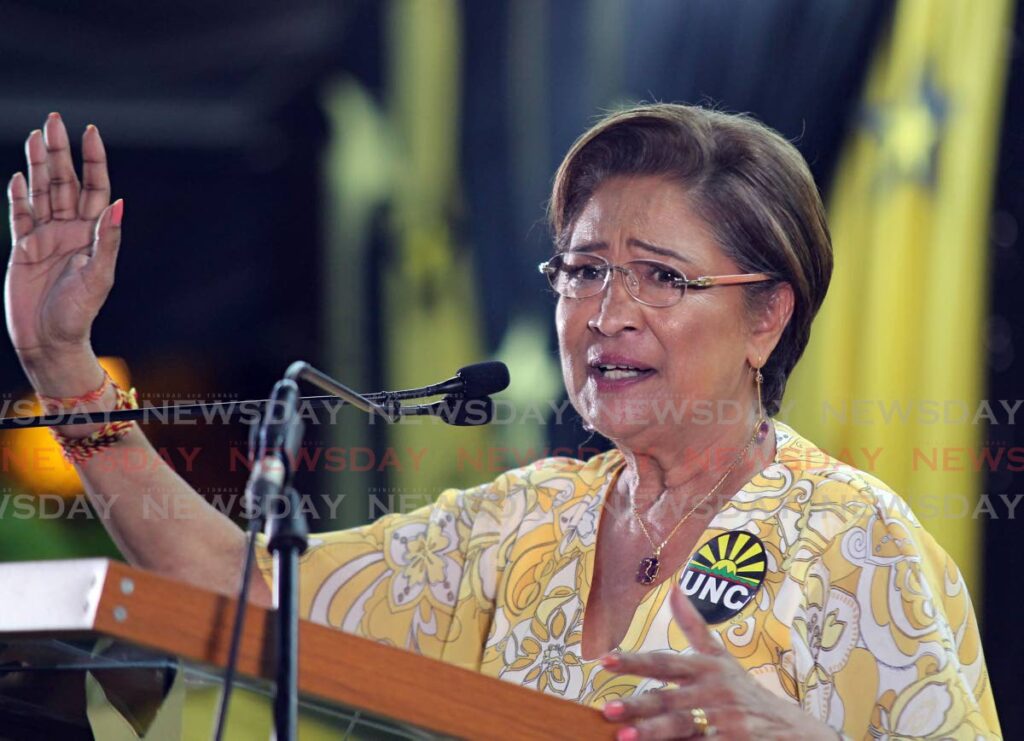Third force vital to defeat PNM

DARREN PRASHAD
THE UNITED National Congress has played a great role since its formation in 1988 (first as Club ’88) in strengthening democracy in Trinidad and Tobago and giving representation to marginalised and alienated nationals. But since 2015, it has declined in importance because of leadership flaws and reluctance of the leader to accept responsibility for repeated defeats.
The UNC has become the weakest opposition since the “No Vote” produced no official opposition between 1971 and 1976. The present opposition, in fact, is compared to a non-opposition in Parliament. Leadership is severely jeopardising the UNC’s political prospects.
The UNC and the opposition are largely leadership-less. The minor parties and Phillip Alexander, Gary Griffith and Watson Duke are far more effective than the UNC and its leader. There is an official opposition leader, but she is ineffective and should have hung up her holster a long time ago, right after the massive defeat in the 2015 election, taking the party downwards from 29 seats in 2010 to 18 seats.
Kamla Persad-Bissessar should have taken responsibility for the party’s devastating electoral outcome in the 2015 and 2020 general elections as well as several local government elections and leave politics.
In the Westminster parliamentary tradition, a leader who loses a general election resigns. In Trinidad, the UNC leader lost two general elections and several local government elections. Yet she renewed her leadership in internal elections earlier this year and announced her intention to lead the party into the 2025 election.
Persad-Bissessar’s continued leadership of the UNC will result in resounding defeats. The political leader fails to recognise that “kamlamania” birthed in 2010 had eroded long before her defeat in 2015 because of failed policies and an inability to hold together her coalition of then opposition parties in 2010; the sheen and shine were long gone by 2015, with defeat staring the party in the face.
For the 2020 election, although advised by political pundits and senior MPs (like Fuad Khan, Fazal Karim and Bhoe Tewarie) within her party to reconcile her differences with other opposition parties and prominent figures (like Basdeo Panday, Jack Warner, Ramesh Lawrence Maharaj, etc) estranged from the UNC, she would have none of it, taking the party to another defeat.
The 2015 and 2020 selection of UNC candidates for the general elections is a lesson in how not to choose candidates. She learned nothing from the 2015 disaster and repeated same in 2020. The 2020 selectees in particular is a lesson in who not to choose – some of the most discredited and disliked people. One of them has a long history of doing anything to get a “safe seat” but could not hold it in a local election. Some of them are like children with no history of achievements or grassroots activism.
Had the UNC united the base and brought back stalwarts (like Panday, Maharaj, Trevor Sudama, John Humphrey, Warner, and so many others) who were alienated and marginalised between 2010 and 2020, analogous to what the PNM did to take it to re-election victory in 2020, the UNC would have handsomely defeated the PNM.
Had the UNC a different leadership, it would have won easily because the people wanted a different PM, not someone who was tried and failed before. The PNM was the most unpopular party in its history in 2020. Yet it defeated the UNC. What does that say about the UNC and its leader? Had the UNC formed an accommodation or alliance with the other opposition parties as it did in 2010, it would have won by a landslide. This idea of going it alone has shown repeatedly that can’t work.
The political landscape has witnessed an evolving situation in which the ruling PNM will remain the dominant political force for the foreseeable future as long as the UNC remains with the current leader and weak, ineffective MPs (not all but most of them).
The dilemma facing the UNC is if it wishes to change its leader, it may not be possible. The party desperately needs a credible, likeable, popular political personality (like Persad-Bissessar was in 2010) with a clear vision and who can pave the way for UNC revivalism.
There is hardly anyone among the MPs, save Rushton Parray, who commands respect, credibility and integrity to lead, but he lacks government experience. There are a few others who are also respected, like Dinesh Rambally and Lackram Bodoe, who don’t have baggage but are still wet behind the ears.
So the UNC must go outside to recruit a leader with a vision. However, Persad-Bissessar would have none of it. The alternative is for alienated and excommunicated forces of the UNC to come together to launch a new vehicle under a dynamic leader with a proven track record able to unite all of the minor opposition parties. Such an amalgamation would pose a serious challenge to both parties, capturing the opposition space.
A strong united third force of all the minor parties, under the leadership of, say, a Basdeo Panday as chair and/or led by a senior figure, someone like a Ramesh Maharaj or a Vasanth Bharat or Fuad Khan or Bhoe Tewarie, would win the heart and imagination of the UNC base. It can then proceed to engage in strategies to defeat the PNM in 2025. Failing that, the PNM will govern at least through 2030.


Comments
"Third force vital to defeat PNM"